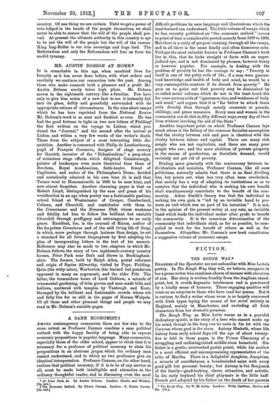A SANE ECONOMIST.f AMONG contemporary economists there are few who
to the same extent as Professor Cannan combine a sane political outlook with the happy faculty of being able to express economic propositions in popular language. Many economists, especially those of the older school, appear to think that it is necessary for a professor of political economy to state his propositions in an abstruse jargon which the ordinary man cannot understand, and to which no two professors give an identical interpretation. Professor Cannan, on the other hand, realizes that political economy, if it is to be of any service at all, must be made both intelligible and attractive to the ordinary thoughtful reader, and in discussing even the most
• At Prior Park. io. By Austin Dobson. London : Chatto and Windus. [Gs. net.1
t Ti,. Economic Outlook. By Edwin Cannan. London: T. Fisher 17nwin. [5s. net.1 difficult problems he uses language and illustrations which the least learned can understand. The little volume of essays which he has recently published on "the economic outlook" covers in point of time a considerable period, namely from 1889 to 1909. But there is a unity of purpose running through all the essays, and in all there is the same kindly and often humorous note. Perhaps the most valuable feature in Professor Cannan's work lies in this, that he looks straight at facts with an unpre- judiced eye, and is not dominated by phrases, however hoary or however popular. For example, in dealing with the problem of poverty be has the courage to say : "Poverty in itself is one of the petty evils of life; if a man were guaran- teed knowledge and health of body and mind, he would be a very contemptible creature if he shrank from poverty." Ho goes on to point out that poverty may be diminished by so-called social reforms which do not in the least touch the far more serious evils of "ignorance, vice, and weakness of body and mind," and argues that it is "far better to attack these evils directly than through merely economic or pounds, shillings, and pence measures. Every man and woman in the community can do this in fifty different ways every day of their lives without invoking the aid of the State."
Another important point on which Professor Cannan lays much stress is the fallacy of the common Socialist assumption that the rivalry between rich and poor is identical with the rivalry between labour and capital. There are many rich people who are not capitalists, and there are many poor people who are ; and the mere abolition of private property in the means of production, as Socialists demand, would certainly not get rid of poverty.
Dealing more generally with the controversy between in- dividualists and socialists, Professor Carman, like all sane politicians, naturally admits that there is no final dividing line, but points out, what has very often been overlooked, that society has a way of adapting its institutions so as to contrive that the individual who is seeking his own benefit shall simultaneously contribute to the benefit of the com- munity. Adam Smith's theory was that the individual in seeking his own gain is "led by an invisible hand to pro- mote an end which was no part of his intention." It is not, in the opinion of the present writer at any rate, an invisible hand which leads the individual seeker after profit to benefit the community. It is the conscious determination of the community that individuals shall, as far as possible, be com- pelled to work for the benefit of others as well as for themselves. Altogether, Mr. Carman's new book constitutes a suggestive volume of economic essays.


















































 Previous page
Previous page